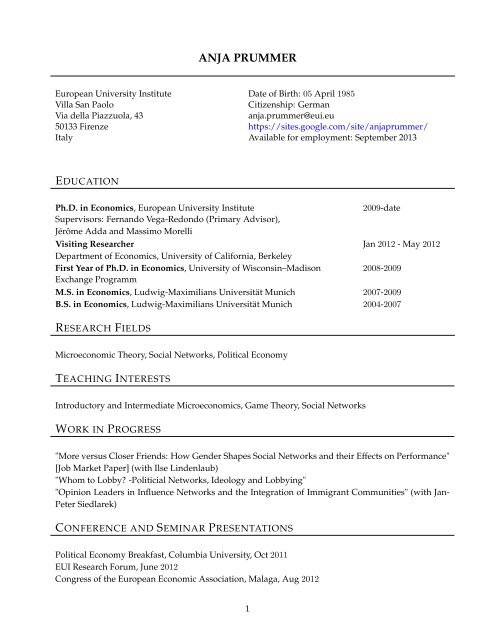CV - Anja Prummer - European University Institute
CV - Anja Prummer - European University Institute
CV - Anja Prummer - European University Institute
Create successful ePaper yourself
Turn your PDF publications into a flip-book with our unique Google optimized e-Paper software.
ANJA PRUMMER<br />
<strong>European</strong> <strong>University</strong> <strong>Institute</strong> Date of Birth: 05 April 1985<br />
Villa San Paolo Citizenship: German<br />
Via della Piazzuola, 43 anja.prummer@eui.eu<br />
50133 Firenze https://sites.google.com/site/anjaprummer/<br />
Italy Available for employment: September 2013<br />
EDUCATION<br />
Ph.D. in Economics, <strong>European</strong> <strong>University</strong> <strong>Institute</strong> 2009-date<br />
Supervisors: Fernando Vega-Redondo (Primary Advisor),<br />
Jérôme Adda and Massimo Morelli<br />
Visiting Researcher Jan 2012 - May 2012<br />
Department of Economics, <strong>University</strong> of California, Berkeley<br />
First Year of Ph.D. in Economics, <strong>University</strong> of Wisconsin–Madison 2008-2009<br />
Exchange Programm<br />
M.S. in Economics, Ludwig-Maximilians Universität Munich 2007-2009<br />
B.S. in Economics, Ludwig-Maximilians Universität Munich 2004-2007<br />
RESEARCH FIELDS<br />
Microeconomic Theory, Social Networks, Political Economy<br />
TEACHING INTERESTS<br />
Introductory and Intermediate Microeconomics, Game Theory, Social Networks<br />
WORK IN PROGRESS<br />
"More versus Closer Friends: How Gender Shapes Social Networks and their Effects on Performance"<br />
[Job Market Paper] (with Ilse Lindenlaub)<br />
"Whom to Lobby? -Politicial Networks, Ideology and Lobbying"<br />
"Opinion Leaders in Influence Networks and the Integration of Immigrant Communities" (with Jan-<br />
Peter Siedlarek)<br />
CONFERENCE AND SEMINAR PRESENTATIONS<br />
Political Economy Breakfast, Columbia <strong>University</strong>, Oct 2011<br />
EUI Research Forum, June 2012<br />
Congress of the <strong>European</strong> Economic Association, Malaga, Aug 2012<br />
1
AWARDS AND DISTINCTIONS<br />
EUI Thesis Completion Grant 2012 - 2013<br />
DAAD Scholarship for Doctoral Studies at the <strong>European</strong> <strong>University</strong> <strong>Institute</strong> 2009-2012<br />
Scholarship of the Kurt Fordan Förderverein 2008<br />
(for the exchange to the <strong>University</strong> of Wisconsin - Madison)<br />
TEACHING EXPERIENCE<br />
Graduate TA Microeconomics II, EUI, Fall 2011<br />
Theory and Application of Non-Cooperative Games: II,<br />
<strong>University</strong> of California, Berkeley, Spring 2012<br />
SKILLS<br />
Languages English (fluent), German (native), Italian (intermediate)<br />
Software Matlab, Stata, Mathematica<br />
REFERENCES<br />
Fernando Vega-Redondo Massimo Morelli Jérôme Adda<br />
Department of Economics Department of Economics Department of Economics<br />
<strong>European</strong> <strong>University</strong> <strong>Institute</strong> Columbia <strong>University</strong> <strong>European</strong> <strong>University</strong> <strong>Institute</strong><br />
Via della Piazzuola 43 420 W. 118th Street, 720 IAB Via della Piazzuola 43<br />
50133 Firenze New York, NY 10027 50133 Firenze<br />
Italy USA Italy<br />
Phone: [+39] 055 4685 951 Phone: [+1] 212 854 5941 Phone: [+39] 055 4685 955<br />
Email: fernando.vega@eui.eu Email: mm3331@columbia.edu Email: jerome.adda@eui.eu<br />
2
PAPER ABSTRACTS<br />
More versus Closer Friends: How Gender Shapes Social Networks and their Effects on Performance<br />
[Job Market Paper]<br />
Men and women differ in terms of their network characteristics, particularly in terms of their clustering<br />
coefficient and degree, with women having a lower degree and a higher clustering coefficient<br />
than men. Taking these network characteristics as given, we show theoretically what are the effects of<br />
these differences on labor market outcomes. We find that women perform better in an environment<br />
with little uncertainty whereas men do better under higher uncertainty. Women in larger networks<br />
perform better than women, who are part of a smaller group. Last, men also perform better if the<br />
future is heavily discounted. We document empirically our key assumption, namely that men and<br />
women have different network characteristics, using the AddHealth Data set.<br />
Whom to Lobby? Politicial Networks, Ideology and Lobbying<br />
We study lobbying with information in a setting where politicians are connected through a network<br />
describing information flows. There are two opposing lobby groups, who choose which politician to<br />
address. The decision depends on the ideological bias of politicians as well as the overall network<br />
structure. We show that there is an interplay between the strength of the network, as given by the<br />
in- formation flow, and ideological bias. More precisely, when the information flow in the network<br />
is high, the effect of the ideological bias is amplified. Further, the network structure affects whether<br />
a priori supporting or opposing politicians are being lobbied. However, it matters not only what<br />
ideological biases politicians have, but also whether they are connected with like- minded politicians<br />
or politicians with a different ideological bias.<br />
Opinion Leaders in Influence Networks and the Integration of Immigrant Communities<br />
This paper studies the cultural and economic integration of immigrant communities in host societies<br />
through a model with two distinct channels of social influence and skills acquisition that act as complements<br />
in the integration process. In the long run, full integration is achieved only in the absence<br />
of strong, non-adapting opinion leaders within the immigrant society. In the presence of such leaders,<br />
integration can remain incomplete, with integration levels higher for individuals of higher ability.<br />
Centralized social structures reinforce differences in integration between individuals of varying ability<br />
levels as they block the channels for moderating influence between them.<br />
3

















